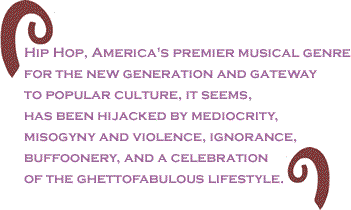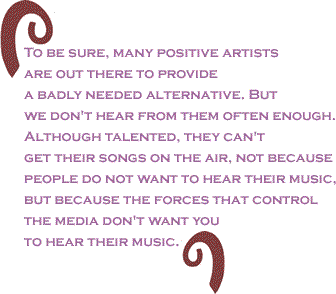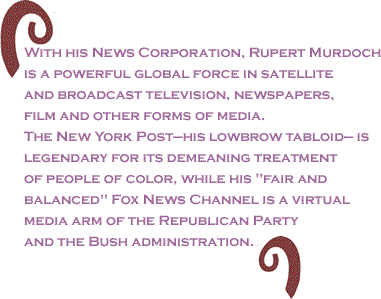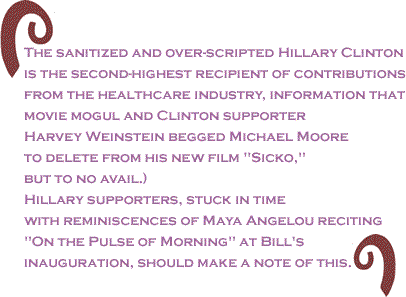
|
|||||||||||||||||||||
|
The current issue is always free to everyone If
you need the access available to a |
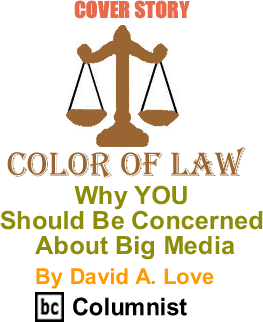 |
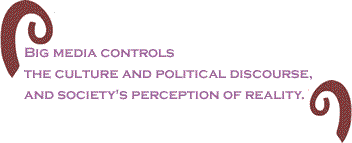 |
At first glance, it would seem that the sad state of Rap and Hip Hop and media mogul Rupert Murdoch's bid for the Wall Street Journal have very little in common. But there is a thread, which connects these two issues: the media are dominated by a fewer and fewer entities, and a handful of corporations control most of what you see, hear and read. They control the culture and political discourse, and society's perception of reality. Many decry the quality of the music these days. Hip Hop, America's premier musical genre for the new generation and gateway to popular culture, it seems, has been hijacked by mediocrity, misogyny and violence, ignorance, buffoonery, and a celebration of the ghettofabulous lifestyle. Bereft of ideas, its artists are running out of lyrical content. Dependant upon stereotyped and caricatured Black machismo, its female artists are disappearing. What happened to the days when music inspired us, touched our emotions, and even, dare I say, occasionally encouraged us to take action? At a time when society is in a dire situation, with assaults from every direction, music is not stepping to the plate to reflect our problems or speak to them, or speak to anything for that matter. To be sure, many positive artists are out there to provide a badly needed alternative. But we don't hear from them often enough. Although talented, they can't get their songs on the air, not because people do not want to hear their music, but because the forces that control the media don't want you to hear their music. Positive music, vibrant, empowering music with a message, is not necessarily in the interests of Big Media, those who own the recording industry, the radio and television networks, and increasingly the Internet. So, Big Media tries to convince us that this garbage is what the people want to hear. But these companies create the demand for trash, and trash is what the audience will receive until it demands more. Meanwhile, Rupert Murdoch recently bid $5 billion to buy the Wall Street Journal's parent Dow Jones, as if he doesn't own enough of the world. With his News Corporation, Murdoch is a powerful global force in satellite and broadcast television, newspapers, film and other forms of media. The New York Post—his lowbrow tabloid— is legendary for its demeaning treatment of people of color, while his "fair and balanced" Fox News Channel is a virtual media arm of the Republican Party and the Bush administration. He even owns MySpace. Interestingly, Murdoch is a major contributor to Hillary Clinton, and hosted a fundraiser for her Senate reelection campaign. (The sanitized and over-scripted Clinton is also the second-highest recipient of contributions from the healthcare industry, information that movie mogul and Clinton supporter Harvey Weinstein begged Michael Moore to delete from his new film "Sicko," but to no avail.) Hillary supporters, stuck in time with reminiscences of Maya Angelou reciting "On the Pulse of Morning" at Bill's inauguration, should make a note of this. And as the New York Times recently reported, Murdoch's publishing business, HarperCollins, gave book deals to a number of lawmakers in Congress who most closely oversee the media industry, not to mention our beloved U.S. Supreme Court Justice Clarence Thomas, whose book is due out next year. Murdoch obtained U.S. citizenship in order to dance around the U.S. laws that limit media ownership by foreign citizens. And in two of the past four years, his News Corporation, with domestic pretax profits of $9.4 billion during that time, paid no federal taxes. Now, he is buying off members of the government, those who make and interpret the laws, so that the laws remain favorable to his business. And it is working.
As Murdoch continues to further expand his media empire, other corporations are doing the same, in a manner reminiscent of the days of the transcontinental railroads and the oil barons. How did this start? The deregulation of the industry began in the 1980s under Reagan, with the elimination of the fairness doctrine. Under the doctrine, the Federal Communications Commission (FCC) viewed stations as public trustees, requiring them to make efforts to provide contrasting points of view, and report on important issues to the community as a public service. In addition, FCC guidelines on minimal amounts of non-entertainment programming, and the maximum amount of advertising permitted in an hour were eliminated. A watershed moment was the enactment of the Telecommunications Act of 1996, which allowed for a concentration of ownership in the media and communications industries, and the mega mergers we see today. Along with welfare reform, this was by no means a bright spot on the Clinton legacy. The Act allowed one company to own up to 35 percent of the media in one market, including newspapers, local radio and television stations, and national television networks. In 2003, the FCC raised this cap to 45 percent. Today, only eight companies dominate the American media market: Disney (market value: $72.8 billion); Time Warner ($90.7 billion); Viacom ($53.9 billion); General Electric (owner of NBC, market value: $390.6 billion); News Corporation ($56.7 billion); Yahoo! ($40.1 billion); Microsoft ($306.8 billion) and Google ($154.6 billion). A number of these corporations dominate the world market as well. Democracy works only with an informed public, and the media are sleeping on the job. In their quest for profits, backed up by unjust laws, these companies are not serving the public interest. The public is left with fewer options, fewer viewpoints, and fewer tools to become effective citizens. U.S. corporate news media are owned by entertainment companies who are obsessed with the bottom line and little else. As a result, much of American television news is worthless, with celebrity gossip and scandal à la Paris Hilton and Ann Coulter offered as information, and the headlines read by vacuous fashion models. Monsters and circus sideshows are created in the process. One must seek independent news sources such as Democracy Now! and The Black Commentator, or foreign sources such as the BBC and the Guardian in order to begin to get to the bottom of things. No diversity of backgrounds or viewpoints Media consolidation has meant the demise of a number of minority and women-owned media, the decline of journalistic standards and slashing of newsroom budgets, and media that are disconnected from the concerns of local communities. Just look at the death of Black talk radio in some parts of the country, or the gutting of public affairs programming at BET once Viacom took over. Women (51% of the population) own a mere 6% of all full-power commercial radio stations nationwide, while people of color (one-third of the population) own 7.7%, according to a study by the nonpartisan media policy organization Free Press. These stations are more likely to provide diverse programming and local content than the white-male-owned venues.
And when the media conglomerates provide what they consider to be serious news, such as the influential Sunday morning talking head shows, people of color and women are excluded in wholesale fashion. According to the watchdog group Media Matters, men outnumber women 4-to-1 on these programs, and whites outnumber everyone else by a 7-to-1 margin. Meanwhile, the hosts of primetime news programs are overwhelmingly white men. And it seems that following the Don Imus controversy, after a temporary bump in diversity of guests appearing on such programs, the news quickly reverted to almost exclusively white guests. Big Media shuns a diversity of viewpoints. Look at what happened to Phil Donahue's show on MSNBC when, despite its high ratings, it became too closely associated with the antiwar movement and was canned as a result. MSNBC is majority-owned by NBC Universal, which is in turn 80 percent owned by defense contractor General Electric. Meanwhile, thoughtful progressive commentary is lacking, on the whole, outside of independent media. Often, the few commentators of color on cable news are conservatives who are bought and paid for by powerful interests, and represent viewpoints that are antithetical to the interests of communities of color. For example, Rev. Jesse Lee Peterson, a darling of the media and frequent guest of Fox News Channel, is a figure who can best be described as the living embodiment of the Boondocks cartoon character Uncle Ruckus. Peterson, who established an annual "National Day of Repudiation of Jesse Jackson," laments that whites are now afraid to criticize blacks. Peterson characterized the victims of Hurricane Katrina as lazy and trifling, and "immoral, welfare-pampered blacks that stayed behind and waited for the government to bail them out." In addition, he called Islam "an evil religion," and said that an official apology for slavery "opens the door for radical Blacks to come in and demand reparations for slavery." Peterson is the head of the Los Angeles-based Brotherhood Organization of A New Destiny (BOND), whatever that is, and lists as one of his advisory board members Sean Hannity, co-host of "Hannity & Colmes," the Fox program that Peterson frequents. Peterson is also a member of Project 21, a Black conservative public policy group which fashions itself as the vanguard of new black leadership and an alternative to the civil rights establishment. The organization's representatives have compared Supreme Court Chief Justice John Roberts to Dr. Martin Luther King, supported extremist judicial nominees, blamed victims of predatory lending for showing a lack of personal responsibility, and condemned a Senate resolution apologizing for its failure to pass anti-lynching legislation. And the organization hailed the Supreme Court's recent outlawing of racial integration plans in public schools as "a necessary step in breaking down existing racial resentment and promoting true equal access to educational opportunity." Project 21 is a creation of the National Center for Public Policy Research (NCPPR), a conservative think tank with ties to ethically-challenged lobbyist Jack Abramoff and former exterminator and disgraced House leader Tom DeLay. NCPPR is bankrolled by such interests as the Richard Mellon Scaife Foundation and the Lynde and Harry Bradley Foundation, who poured money into studies in the 1990s to prove the genetic inferiority of blacks and other minority groups. Another well-known black conservative, columnist Armstrong Williams, was paid $240,000 by the Bush criminal machine to sell the administration's "No Child Left Behind" policy on his nationally syndicated television show.
For all of their talk about pulling themselves up by their bootstraps, Black conservatives would perish but for support from sketchy conservative philanthropy and undue exposure in the media. Project 21, Jesse Lee Peterson and Armstrong Williams are of little consequence by themselves, as they are fungible commodities that the media and the political elites can replace at will. What is important here is that Big Media can create its own reality and control the public's perception of reality. In the absence of countervailing points of view on the air, Peterson and those of his ilk are perceived by the greater society as legitimate views in the Black community, if not viable and acceptable representatives of Black America. Journalists and politicians working together But perhaps the most ominous consequence of this media conglomeration madness is the coziness between the people in power and those who are covering them. Big Media is Corporate America, after all, which is entrenched power, the status quo, not an agent of change. This year's Radio and Television Correspondents' dinner in Washington—in which Bush kingmaker "M.C." Karl Rove entertained the audience with a rap song— was a most shameful example of how many establishment journalists are shirking their responsibilities. It is hard to picture a journalist laughing it up and having a drink with a politician one night, and then writing an investigative piece exposing that person's wrongdoing the next day. Look at what happened with the Iraq War. Hack Washington reporters, star struck and eager to get access and hobnob with the elites, copied the fallacious White House press releases verbatim as if they were fact. Thousands of Iraqis and Americans have paid the ultimate price for a rubber stamp press that endorses rather than challenges and exposes government impropriety. At one press conference, Bush the Decider had the White House press corps read their questions from a prepared list. Had these reporters been doing their job, M.C. Rove and other members of this administration would be behind bars right now, criminals that they are for breaching the public trust and using the government as their personal tool.
It doesn't have to be this way, nor should it be. The solution to the media crisis is twofold: we must hold the media giants accountable to the public, or revoke their corporate charters and force them to relinquish their FCC licenses, while at the same time develop and nurture independent media sources that reflect our values and speak truth to power. A daunting task, perhaps, but we are up to it, and there is no other choice if we hope to take back what is left of this democracy. BlackCommentator.com Columnist David A. Love is an attorney based in Philadelphia, and a contributor to the Progressive Media Project and McClatchy-Tribune News Service. He contributed to the book, States of Confinement: Policing, Detention and Prisons (St. Martin's Press, 2000). Love is a former spokesperson for the Amnesty International UK National Speakers Tour, and organized the first national police brutality conference as a staff member with the New York-based Center for Constitutional Rights. He served as a law clerk to two Black federal judges. Click here to contact Mr. Love. |
| July
12, 2007 Issue 237 |
|
| Printer Friendly Version in resizeable plain text format |
 |
 |
 |
| |
| |























